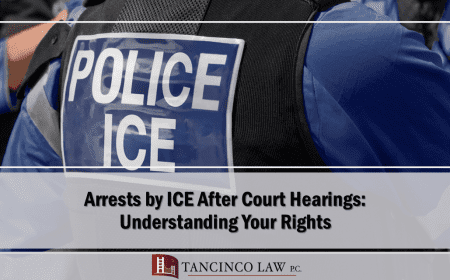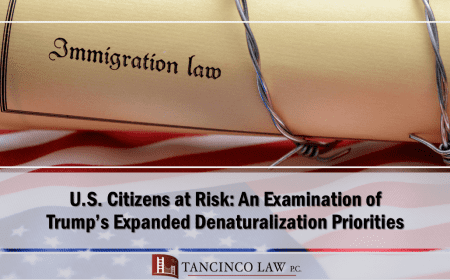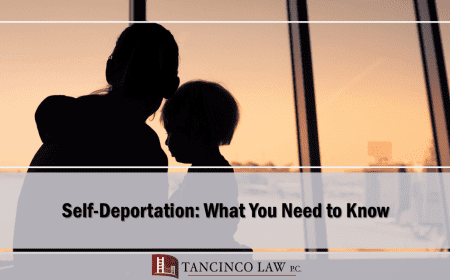On August 12, 2019, USCIS released the new public charge rules. This will take effect in 60 days from publication or in October 2019. A “public charge” finding is a ground for inadmissibility or basis for denial of visas. An individual is considered a public charge if s/he is dependent primarily on government assistance for her/his subsistence.
Gel Santos-Relos, the popular, proficient journalist and broadcaster from Balitang America interviewed me on this new public charge rules. Here are my responses to her questions which also happened to be the most frequently asked questions on this issue.
Q: What is the difference between this new public charge policy and what have been followed by the USCIS for so many decades?
A: Prior to this new policy, an applicant for green card may submit an Affidavit of Support accomplished by the Petitioner or a co-sponsor to indicate that the applicant will not be a public charge. This was sufficient under the prior rules. Now with the new public charge rules, an affidavit of support is just one of the factors taken into account. Instead, a totality of circumstances will be examined and the USCIS may now look into other factors such as employability, age, health and prior receipt of public benefits by the applicant as indicative that the applicants is more likely to become a public charge and be denied the green card application. Another difference, is the expansion of the meaning of public charge. This rule redefines the term ‘‘public charge’’ to mean an alien who receives one or more designated public benefits for more than 12 months in the aggregate within any 36-month period (such that, for instance, receipt of two benefits in one month counts as two months). This rule defines the term ‘‘public benefit’’ to include cash benefits for income maintenance, SNAP, most forms of Medicaid, Section 8 Housing Assistance under the Housing Choice Voucher (HCV) Program, Section 8 Project-Based Rental Assistance, and certain other forms of subsidized housing.
Q: What kind of applicants will be directly affected by this new ruling published by the DHS?
A: Those who will be directly affected are the applicants for immigrant and non-immigrant visas or those seeking to apply for green cards or immigrant visas through adjustment of status or through consular processing . Also important to note, are green card holders who are seeking admission or have been out of the country for at least 180 days and re-entering the U.S. They will be examined also if they are considered public charge.
Q: Any type of applicants who are exempted from this new ruling?
A: The published regulation excludes from the public benefits definition: public benefits received by individuals who are serving in active duty or in the Ready Reserve component of the U.S. armed forces, and their spouses and children; public benefits received by certain international adoptees and children acquiring U.S. citizenship; Medicaid for aliens under 21 and pregnant women; Medicaid for school-based services (including services provided under the Individuals with Disabilities Education Act); and Medicaid benefits for emergency medical services.
Q:What if the applicant has been working in the United States with the proper and valid working visa, and later on had been approved for a green card, had a work authorization and had been paying all required taxes taken from his or her paycheck. And then an emergency happened — whether it be losing a job, or a medical emergency, which made the applicant access publicly funded benefits just at the time he could already apply for adjustment of status. Would this cause him to be inadmissible and his application be denied?
A. Medicaid benefits for medical emergency services are exempt from the definition of public benefits. But if this applicant continue to avail of the publicly funded medical services as defined in the regulation, s/he would likely be considered a public charge and this fact is a ground to deny the application for adjustment of status.
Q: The provision on the new public charge rule states that “, the consular officer or the Attorney General shall at a minimum consider the alien’s-(I) age; (II) health; (III) family status; (IV) assets, resources, and financial status; and (V) education and skills . .”. How are these measured? Or are these solely dependent on the impression or subjective determination of the consular officer or Attorney General?
A: While admittedly the consular officers or USCIS examiners have wide discretion in determining public charge, there are also parameters on what weigh heavily in examining the applicants. For example on age, applicants under 18 not accompanies or following to join a parent or guardian and or applicants advanced age is a negative factor. On the health factor, applicant’s chronic health conditions with high medical costs or that may prevent applicant from maintaining employment are viewed as negative factors.
Q: What repercussions would this expanded public charge rule have on immigrants including the Filipino American community?
A:The way these new public charge rule is drafted seemed to be designed to create fear and confusion among our immigrant communities. The unfortunate consequence is on those who really are in need of medical aid. As a result of these new rules, it is most likely that legal immigrants will be forced to avoid much needed medical help at the expense of their health just to keeping their families together and prevent repercussions on their family members. In short, this policy places at risk the health and safety of families throughout the nation and that includes our Filipino immigrant community.
Q: Immigrant rights advocates say this Trump Administration ruling should not just be rolled back, but that the public charge rule should totally be abolished. But would you agree that there are indeed some immigrants who abuse the system and just totally rely on the government for their needs? How should this be addressed?
A: The current rules are fine as they are and there is no need to change them. I do not want to see current public charge rule abolish but also I do not wish it be changed either. There is no need for this new public charge rule. Expanding the rules to prevent deserving immigrants from entering the United States to be with their family is simply cruel and unjust.
Q: Would this Final Ruling be in effect immediately? Is there anything the people can do to voice out their opposition to or support for this expanded public charge ruling?
A. The rule takes effect on October 15, 2019. There is a 60 day rule from publication before it takes effect. Those who are opposed to the public charge rules must contact their respective legislators to voice their opposition. Or they can also contact and support organizations that have filed lawsuits to abolish these new rules.
(Atty. Lourdes S. Tancinco is an immigration attorney based in San Francisco CA. She may be reached at law@tancinco.com, facebook/tancincolaw, or at 1-888-930-0808)




